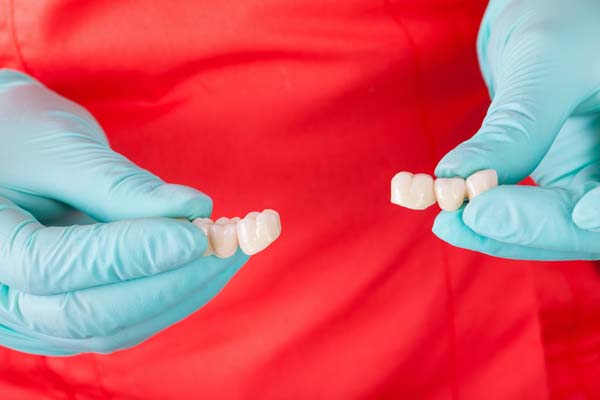What Are Partial Dentures?

Partial dentures are a popular replacement option for missing teeth. You could potentially benefit from them if you have lost some of your permanent teeth, but there are still some healthy ones that remain in the jaw. Your dentist can explain if you are a candidate for partials. If you are, you should learn all you can about them before you decide.
Common questions about partial dentures
If you are thinking about partials, you probably have many questions about them. Here are some of the things that people typically want to know.
Who qualifies for partial dentures?
Partial dentures are typically recommended for someone who has two or more missing teeth that are right next to each other. However, if you have multiple missing teeth that are not right next to each other, or if you are only missing one tooth, then you may need to seek out another treatment option.
Why would a dentist recommend partial dentures?
Tooth loss can cause extensive changes in the jaw. Because these changes can be detrimental, dentists prefer to leave healthy teeth in the jaw whenever possible and save extraction as a last resort. Partials are a way to retain healthy teeth while replacing those that are missing for a return to normal function and approximate appearance.
How are partials different from full dentures?
The most obvious difference is that a full set of dentures replaces all the teeth in the mouth while partials only replace some of them. However, there are other variations between the two. Partials have parts that full dentures lack. For example, partials usually have at least some metal components, while full sets typically have none.
How durable are partial dentures?
The durability of your partial dentures depends on the materials used and whether your healthcare provider gave you temporary or permanent partial dentures. Typically, metal dentures are the most durable, while plastic ones are easier to damage. There are also hybrids that are somewhere in the middle. Keep in mind that the term "permanent denture" is often misleading, too. Even a permanent denture option will need to be replaced every 5 or 10 years due to wear and tear.
What are the different parts of a partial denture?
A partial denture usually consists of these basic parts:
- Replacement teeth
- Plastic base to hold the replacement teeth
- Metal framework to support the plastic base with the teeth in it
How do partials stay in the mouth?
Partials stay in place partly because of clasps or other connectors that allow them to attach to the remaining adjacent teeth. The connections anchor the partial and hold it in place. Clasps may be made of plastic or metal. Other attachments may be more advanced. If desired, you can also use dental adhesive on your partials to help keep it from moving.
What are some of the different types of partials?
There are several ways to categorize partial dentures. They can be classified according to the materials used to make them, e.g., plastic bases versus metal bases versus lightweight thermoplastics with no metal also called flexible dentures.
Another way of categorizing partials is by the location of the teeth they are replacing. If the missing teeth are in the back, they are posterior partials, whereas anterior partials replace teeth missing from the front of the mouth.
How do you eat with partials?
When you first get your partial, you cannot go immediately back to eating the way you did before your tooth loss. It takes time to adjust to your new dental appliances. During this time, you should cut your food into small pieces and choose soft foods that are easier to chew. To maintain even pressure, you should practice chewing on both sides of the mouth at the same time. Even after the adjustment period, you should avoid hard or sticky foods.
Conclusion
If you have healthy teeth remaining in your jaw and your dentist wants you to keep them, a partial denture may be an option for the restoration of your missing teeth. Always be sure to talk through each option you have before making a decision. This way, you can be sure that you are making the right choice for yourself and your medical needs. Finally, be sure to give yourself time to adjust to the new dentures. It can take up to one month to use them properly.
Request an appointment here: https://smilefreshdentalauburnhills.com or call Smile Fresh Dental at (248) 260-2927 for an appointment in our Auburn Hills office.
Check out what others are saying about our dental services on Yelp: Dentures and Partial Dentures in Auburn Hills, MI.
Related Posts
Same-day dentures provide an efficient, comfortable, and aesthetically pleasing option for patients seeking immediate solutions after tooth loss or extractions. Same-day dentures, often called immediate dentures, allow patients to receive functional teeth replacements on the day of tooth removal, minimizing downtime and maintaining appearance. Understanding the entire process—from consultation to recovery—can help patients approach treatment…
Are you considering getting dentures, or have you recently started wearing them? Maintaining good oral hygiene with dentures is essential for overall health and well-being. However, it is common to have questions about how to properly care for your dentures to protect your oral health.Like natural teeth, dentures need regular cleaning to prevent plaque buildup…
Dentures have come a long way, as we can now provide multiple options to address missing teeth — from one tooth to a full mouth restoration. With customized partial dentures, patients can restore the function and appearance of their smile. If you want to restore your smile’s functionality without sacrificing a natural, healthy appearance, take…
Dentures will give you the freedom to smile, speak, and eat well. These custom-fit restorations can provide comfort while wearing them. Knowing how these restorations can help your appearance, you can make informed decisions before your treatment. Here are the details on how dentures can enhance your smile.Dentures can replace missing teeth and can be…
